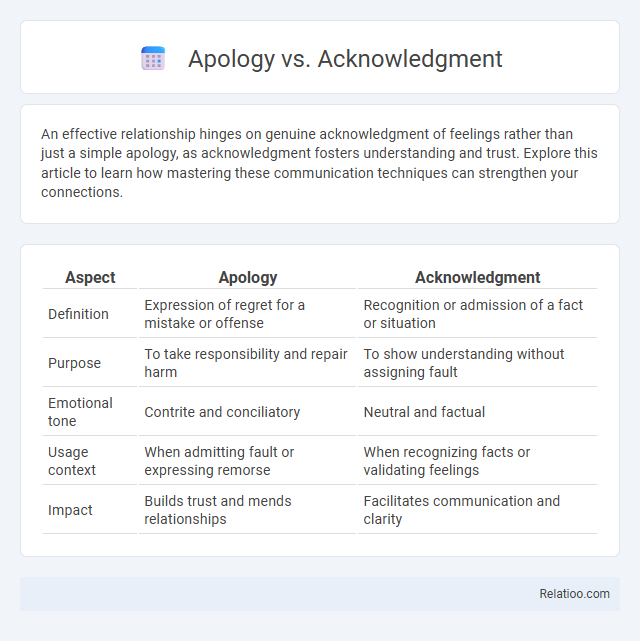An effective relationship hinges on genuine acknowledgment of feelings rather than just a simple apology, as acknowledgment fosters understanding and trust. Explore this article to learn how mastering these communication techniques can strengthen your connections.
Table of Comparison
| Aspect | Apology | Acknowledgment |
|---|---|---|
| Definition | Expression of regret for a mistake or offense | Recognition or admission of a fact or situation |
| Purpose | To take responsibility and repair harm | To show understanding without assigning fault |
| Emotional tone | Contrite and conciliatory | Neutral and factual |
| Usage context | When admitting fault or expressing remorse | When recognizing facts or validating feelings |
| Impact | Builds trust and mends relationships | Facilitates communication and clarity |
Understanding Apology vs Acknowledgment
Understanding the difference between apology and acknowledgment is crucial for effective communication and conflict resolution. An apology involves expressing remorse for a specific wrongdoing or harm caused, taking responsibility for one's actions, whereas an acknowledgment simply recognizes the issue or the other person's feelings without admitting fault. You can foster trust and empathy by choosing whether to offer an apology that conveys genuine regret or an acknowledgment that validates the other person's experience.
Definition of Apology
An apology is a formal expression of remorse or regret for a mistake, wrongdoing, or offense that acknowledges responsibility and seeks to repair the damage caused. Unlike acknowledgment, which simply recognizes an issue or fact without expressing regret, an apology actively conveys empathy and accountability. Apologies often play a critical role in conflict resolution by fostering trust and facilitating reconciliation.
Definition of Acknowledgment
Acknowledgment is the explicit recognition or admission of a fact, situation, or mistake without necessarily expressing regret, distinguishing it from an apology which conveys remorse and responsibility. While an apology includes both admitting fault and expressing sorrow, acknowledgment simply confirms awareness or acceptance of the issue. In communication and conflict resolution, acknowledgment serves as a crucial step for validating concerns before proceeding to apologies or corrective actions.
Key Differences Between Apology and Acknowledgment
An apology expresses regret and often includes taking responsibility for a mistake or wrongdoing, while an acknowledgment simply recognizes a situation or fact without admitting fault. You may offer an acknowledgment to show understanding of someone's feelings or circumstances, whereas an apology specifically aims to repair trust by validating harm caused. The key difference lies in an acknowledgment being a neutral recognition, whereas an apology involves empathy and accountability for the impact on others.
Psychological Impact on Recipients
Apology, acknowledgment, and expression of regret each have distinct psychological impacts on recipients, influencing emotional healing and trust rebuilding in different ways. An apology conveys responsibility and remorse, often leading to forgiveness and reduced anger, while acknowledgment validates the recipient's feelings without necessarily expressing remorse, fostering understanding and empathy. Your choice between these responses can shape emotional outcomes by either promoting reconciliation through heartfelt accountability or simply offering validation of experiences.
When to Apologize vs When to Acknowledge
You should apologize when your actions have directly caused harm or distress, taking full responsibility for the impact. Acknowledgment is appropriate when recognizing someone's feelings or experiences without admitting fault, showing empathy and validation. Understanding the difference ensures effective communication and maintains trust in personal or professional relationships.
Common Misconceptions
Common misconceptions confuse apology, acknowledgment, and admission of fault, often treating them as interchangeable when each carries distinct meanings. An apology expresses remorse and takes responsibility, whereas acknowledgment merely recognizes an event or feeling without assigning blame. Admission of fault explicitly accepts liability, which may have legal or relational consequences, highlighting the importance of precise communication in conflict resolution.
Role in Conflict Resolution
Apology plays a critical role in conflict resolution by expressing remorse and taking responsibility for a wrongful action, fostering emotional healing. Acknowledgment involves recognizing the other party's feelings or perspective without necessarily admitting fault, which validates experience and lays the groundwork for dialogue. Your choice between apology and acknowledgment impacts the tone and progress of resolution, with apology often facilitating deeper reconciliation and acknowledgment promoting understanding.
Cultural Perspectives on Apology and Acknowledgment
Cultural perspectives shape how apology and acknowledgment are perceived and expressed, with societies like Japan emphasizing formal apologies as a sign of deep respect and social harmony, while Western cultures may prioritize acknowledgment as a way to validate feelings without necessarily admitting fault. Understanding these nuances allows you to navigate cross-cultural interactions more effectively, respecting the underlying values and communication styles. Recognizing the difference between apology and acknowledgment in various cultural contexts can prevent misunderstandings and foster stronger relationships.
Practical Examples and Best Practices
Apology involves expressing regret for a wrongdoing, while acknowledgment simply admits the fact without expressing remorse; for example, saying "I'm sorry for the delay" is an apology, whereas "I recognize the delay happened" is an acknowledgment. Best practices suggest combining both by acknowledging the issue and offering an apology to demonstrate accountability and empathy, such as "I acknowledge the delay and apologize for any inconvenience it caused you." Your effective communication should focus on clarity, sincerity, and taking responsibility to maintain trust and resolve conflicts efficiently.

Infographic: Apology vs Acknowledgment
 relatioo.com
relatioo.com